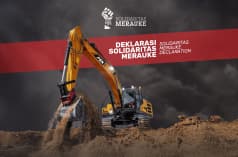Frequently asked questions
Why is rainforest conservation important?
People committed to the protection of rainforests and their inhabitants and dedicated to social reforms can’t help but interfere with the business interests of timber and cattle barons, oil and mining companies, Western banks and corrupt politicians. They all stand to make quick profits from the destruction of rainforests, while nomads, rubber tappers, indigenous tribes and small farmers depend on the forests for their livelihoods.
Without international assistance, rainforest dwellers are often powerless, facing discrimination as ethnic minorities and lacking the financial resources to assert their rights.
We support those fighting for the rainforest, for example the indigenous Sarayacu in the southern Amazon region of Ecuador, who are struggling desperately against oil companies operating in their traditional tribal region. Or the Pygmies of central Africa, whose ancestral lands are being destroyed by timber companies. Or WAHLI, an environmental coalition on the Indonesian island of Sumatra, in its fight for the people there whose forests are being cut down to feed paper mills, or to make room for palm oil plantations. Rainforests have given rise to tremendous biodiversity and highly complex interdependencies. And that is precisely what makes them so vulnerable, which is why we need to fight for them – day in, day out.
How is Rainforest Rescue funded?
Rainforest Rescue was founded in 1986 by Reinhard Behrend, and his life’s work is being continued by the present co-chairs, Bettina Behrend and Marianne Klute. We are a politically independent environmental organization that is dedicated to the rainforest peoples and their habitats. We receive no assistance from the government or businesses and rely solely on donations to fund our operations. Around 3,500 people currently support us with donations on an annual subscription basis, while thousands more have made individual pledges, large and small. We raise a small share of our budget through the sale of t-shirts, CDs and posters.
How much of my donation benefits the projects?
A large proportion. As a small environmental organization, our overhead is very low. Ökotest, a German magazine that publishes consumer reviews from an environmental perspective, rated us as “very good”, confirming that most of the funds we receive flow directly to the people working to preserve the rainforests in their native countries, and that we are highly efficient in our use of donations for information campaigns.










